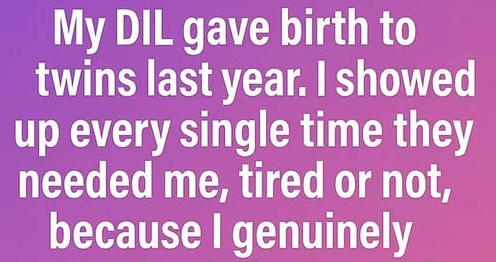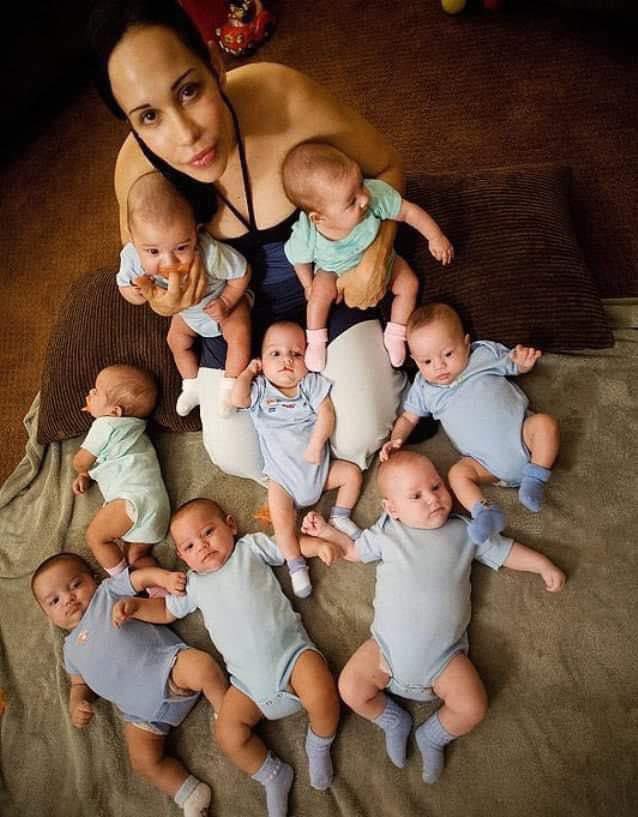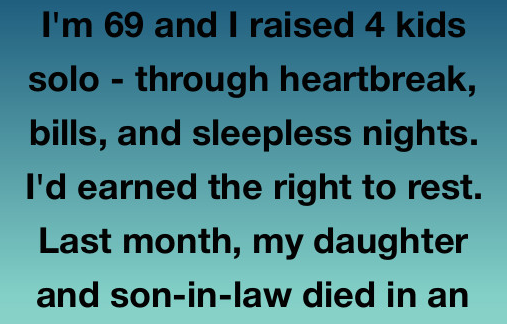When you cherish your family, you pour out your heart. You show up with open hands. You nod yes, even when exhaustion tugs at you, even when no one directly invites you to step in.
That’s precisely what I did last year when my daughter-in-law welcomed twins into the world. I set aside my own plans to stand by her side—because that’s what family means to me. I wanted to ease her load, not only for the newborns but for her well-being. I remembered the whirlwind of early motherhood, how it could leave you feeling adrift.
So, I dove in—cooking meals, folding clothes, soothing babies, and tackling errands. My spirit was brimming, and my motives were pure.
Yet, something unexpected stirred—a pang of hurt that I hadn’t anticipated.
A Picture That Spoke Volumes
One calm evening, as I scrolled through social media, I stumbled upon a photo my daughter-in-law shared. It captured a tender moment of me cradling the twins. But the caption froze me in place.
She wrote about feeling overwhelmed. About craving room to breathe. About the challenge of voicing her need for distance when someone’s kindness overflowed.
She didn’t name me outright, but the message was clear. She meant me.
My heart dipped. Had my efforts to support her crossed an invisible boundary?
When Heartfelt Efforts Fall Short
At first, defensiveness surged. I had poured out my time, energy, and love. I had paused my own life to ensure she felt supported. Couldn’t she see my devotion?
But as I reflected, a truth emerged: even the warmest intentions can feel heavy to someone navigating their own struggles.
Offering too much can seem like overstepping. Generosity without pause can feel like expectation. What I viewed as love, she might have perceived as excessive presence.
This wasn’t about pointing fingers. It was about finding equilibrium. And we had lost it.
The Strength to Speak with Care
I didn’t want to harbor bitterness, nor did I want our bond to fray in silence. So, I invited her for a heartfelt conversation.
It wasn’t simple.
I approached her without anger or guilt. I shared how much joy I found in being part of her new journey as a mother. I explained that supporting her was a highlight of my life—but her online words had caught me off guard, leaving me feeling undervalued.
She paused, her gaze softening. Then, she let out a breath.
“I was so overwhelmed,” she admitted. “I didn’t know how to ask for space without seeming ungrateful. Hurting you wasn’t my intention.”
In that moment, the weight between us lifted.
A Lesson Learned Late in Life
That exchange taught me something profound in my 60s: support is only valuable when it’s welcomed.
We often discuss boundaries for new parents, but rarely for grandparents. Especially for those of us who equate family with constant action—always giving, always doing.
Yet, I’ve learned that boundaries aren’t rejection. They’re a form of respect. They allow love to flourish freely.
Now, I check in before stepping in. I ask how she’s feeling and, more importantly, how much involvement she desires. Some days, she welcomes my company. Others, she needs solitude.
And I respect her wishes.
What Gratitude Truly Means
In those early months, I hadn’t realized how much I longed for acknowledgment. I didn’t need grand gestures. A simple thank-you, a kind word, or a small note would have warmed my heart more than she realized.
I see now that when everyone’s stretched thin—new parents, grandparents, all of us—it’s easy to overlook refilling each other’s emotional reserves.
Since our conversation, we’ve both made small changes. She reaches out more. I voice when I need a pause. We no longer tiptoe around each other, guessing at unspoken feelings.
We communicate. Openly. Kindly.
And that has transformed everything.
The Subtle Art of Releasing Control
Releasing the need to steer doesn’t mean letting go of love.
As a mother, I was accustomed to leading the way. As a grandmother, I carried that same energy into a role that called for something gentler. I had to learn to uplift without guiding, to assist without taking charge, and to let my daughter-in-law carve her own path through motherhood.
That shift took time.
But now, I embrace the freedom of letting love evolve. I no longer gauge my value by how much I contribute. Sometimes, the greatest gift I offer is space.
Family Isn’t About Flawlessness
This journey reminded me that family isn’t about perfection. It’s about embracing feedback, even when it stings. It’s about growing closer, not drifting apart.
I still visit the twins often. I still lend a hand when needed. But now, I also prioritize myself. I rest. I say no when I’m weary. I let them navigate their own way, even when I could step in.
And because of this balance, our bond is stronger. More respectful. More authentic.
To Every Grandparent Pouring Out Their Heart
If you’re reading this and recognize yourself—offering your love and effort only to feel unseen or misunderstood—know this:
You’re not alone.
Your love is invaluable. But your peace matters too. Helping is a treasure, but it should never come at the expense of your serenity or sense of self.
Pause to reflect on your own needs. Set boundaries with kindness. Ask for gratitude when you need it. And remember that the most meaningful connections are built not through endless giving, but through mutual respect.




